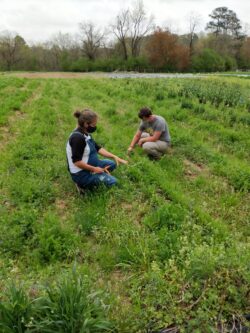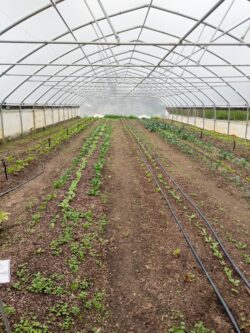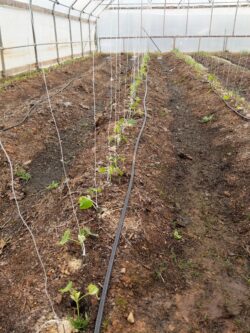A Taste of Our Agroecology Education Farm
“Feeding the Future, One Mind at a Time”
Written by Lauren Schulker, Junior, Applied Nutrition Major
Did you know that a portion of the produce you find in some of the on-campus dining halls is locally grown just down the road from NC State’s campus? Fresh produce is delivered to select locations weekly from our very own Agroecology Education Farm. The mission of this farm is to promote agroecology and sustainable food systems by providing a diversity of experiential learning opportunities for NC State and the broader community.

You might be wondering what agroecology is. Agroecology is a term used to describe the application of ecological principles to agricultural systems and practices. This very ideal is present throughout the farm and implemented by farmers and students alike. Farm manager Alison Reeves spends her time planting seeds and harvesting what is grown from carrots and kale to strawberries and grapes to be used in recipes and brought to your plate in the dining halls.
She does this with the help of a team of students and faculty sharing a common goal to connect the community to the farm and each other. While providing freshly grown produce, the farm is used as a source of food and agroecology education for students who visit and those who eat at dining locations.

Each season provides opportunity for a diverse selection of produce growing on the farm. If you were to visit around the spring you may find that vegetables such as radishes, carrots, beets, kale, swiss chard, pears, lettuce, and spinach are ready for harvest. While I was visiting the farm we even had the opportunity to try carrots freshly pulled from the ground! By the time summer comes, the farm will be growing things such as squash, peppers, tomatoes, melons, eggplant, and cucumbers. Although the temperature begins to drop in the fall, with the help of greenhouses, also called hoop houses, allow for the continuation of many summer crops. Winter crops are mainly found in greenhouses including broccoli, brussels sprouts, beets, cauliflower, herbs, lettuce, and some flowers.
The harvest is spread between various locations including some dining halls and a portion is donated to the InterFaith Food Shuttle and other local organizations. In an effort to connect the community with food grown here, the Agroecology Education Farm offers regular volunteer days where you can help harvest crops and learn more about the sustainable farming done by this amazing team.

Next time you find yourself in Fountain Dining Hall adding lettuce to your burger or grabbing a slice of watermelon, you may find yourself thinking about where it came from. Knowing where our food comes from and being involved in the process one way or another helps us to feel more connected to our food and more connected to our community. Knowing even a fraction of our food comes from our very own local Agroecology Education Farm is an important step to supporting sustainable farming and nutrition education.
References:
https://agroecologyeducationfarm.wordpress.ncsu.edu/get-involved/